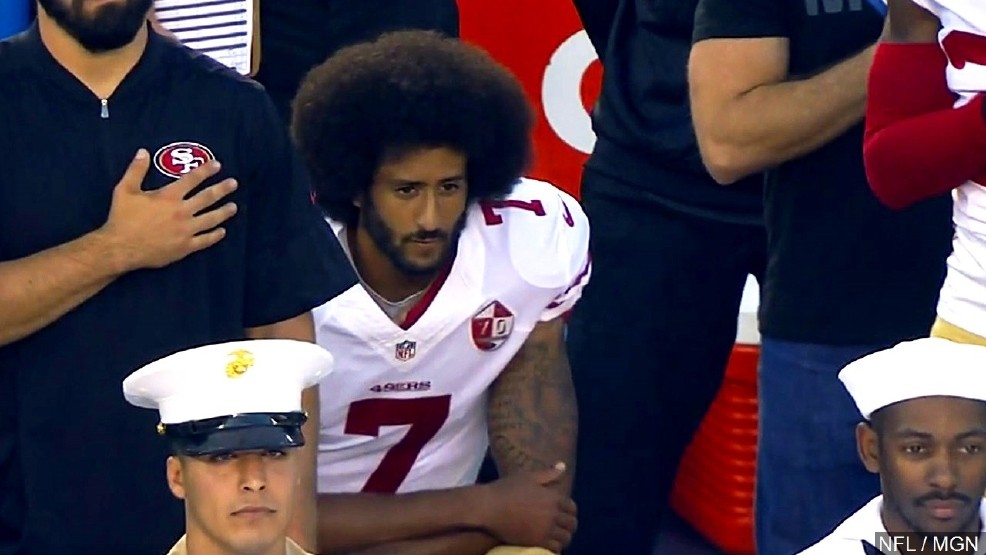Kaepernick’s protest allowed politics to invade the sports world, which is unfortunate because sports should provide an opportunity for a break from national divisions.

A month ago, San Francisco 49ers quarterback Colin Kaepernick mysteriously sat on the bench during the rendition of the national anthem, sparking everyone’s interest. Did Coach Chip Kelly relegate him to the sidelines as the backup to Blaine Gabbert? Was he injured, unable to stand or walk? Why was he sitting? The answer, it turned out, was vastly different than the assumptions: Colin Kaepernick sat down during the national anthem to protest what he believes is racial injustice and oppression with the intent of calling attention to and righting the supposed wrongs of America. An unlikely source of moral arbitration, Kaepernick’s demonstration was powerful and well-intentioned. Its effect was deafening. “When there’s significant change and I feel that flag represents what it’s supposed to represent, and this country is representing people the way that it’s supposed to, I’ll stand.”
Kaepernick’s unceremonious demonstration is significant in a lot of ways. As a quarterback in the nation’s most popular sports league, he possesses immense clout and a national platform, with virtually every one of his action’s being closely documented by the sports media, good or bad. Whether it’s a mistake on the field, rumors of locker room turmoil, or a public relations gaffe, anything can appear on Adam Schefter’s twitter feed, especially when it strays from the norm.
In the NFL, the norm is visible patriotism. By any reasonable measure, the NFL is patriotic: elaborate national anthem ceremonies, aircraft flyovers, enormous flags, and celebrity singers are all regular features at the beginning of games. Patriotism is clearly part of the culture, and the image projected to the millions watching across the country; yet, Kaepernick broke from the pack, violating an unspoken but universally understood rule by sitting when expected to stand.
Refusing to stand for the national anthem is certainly newsworthy, and naturally, the hungry-for-attention media sunk its teeth into this all-encompassing story—a juicy package of sports, race politics, and cultural dissent—offering widespread and polarizing coverage of Kaepernick’s unique demonstration. As a matter of fact, this story has only continued to grow, attracting national attention and inspiring numerous athletes with similar sentiments to join the movement.
Fellow football players from teams around the league, along with soccer star Megan Rapinoe and other athletes, have either sat, knelt, or raised their fists in solemn protest. Even several University of Michigan football players—Channing Stribling, David Dawson, Jourdan Lewis, Khalid Hill, Mike McCray, Devin Bush and Elysee Mbem-Bosse—have chosen to take part as well, notably during the home game versus Pennsylvania State University on Saturday, September 24. It is apparent that, ever since Kaepernick took up the mantle, athletes all across the sports sphere have joined the cause.
If his goal was to receive abundant media coverage to further his movement and bring awareness, then he unquestionably succeeded; but it was through wholly unproductive means that Kaepernick was able to obtain such excessive attention. Disrespecting the national anthem alienated a substantial chunk of the population that doesn’t wish to be bombarded with political messages—especially divisive ones—during football games. It is poisonous, unproductive, and pointless to propose change while estranging the very people you wish to convince. People of all political persuasions watch sports with the expectation that they will remain apolitical American pastimes. Kaepernick’s protest allowed politics to invade the sports world, which is unfortunate because sports should provide an opportunity for a break from national divisions. They should be reserved for leisure, not the deeply divisive notions inherent to politics.
It is admirable, though, to stand up (or sit down, I guess) for an honest cause. Kaepernick is fighting for his heartfelt beliefs with conviction, but hidden under that superficial veil is a deep-seated misunderstanding of America and its values. Nobody believes America is historically faultless or ideal for all its citizens. Anyone with moral and intellectual clarity will recognize that America is not perfect. What Kaepernick may not realize is that standing for the national anthem isn’t a jingoistic gesture of mindless obedience or tacit approval of the many atrocities committed in America, past and present. Rather, it is an embodiment of solidarity and an implicit call for unity, promising community and togetherness to all Americans. Not that community in and of itself is a virtue, but the act of coming together is a powerful display that speaks to the importance of the national anthem. The anthem means far more than the misguided notions that prompted Kaepernick’s protest.
Of course, I cannot forget to emphasize his right—and my vigorous support of it—to free speech and expression. This is not in question. I only seek to criticize Kaepernick for his actions, and that needn’t come in conflict with my commitment to the preservation of freedom of speech.
America is not impervious to mistakes, immune from error. But that shouldn’t prevent anyone from standing up for the ideals it represents. It certainly won’t stop me.